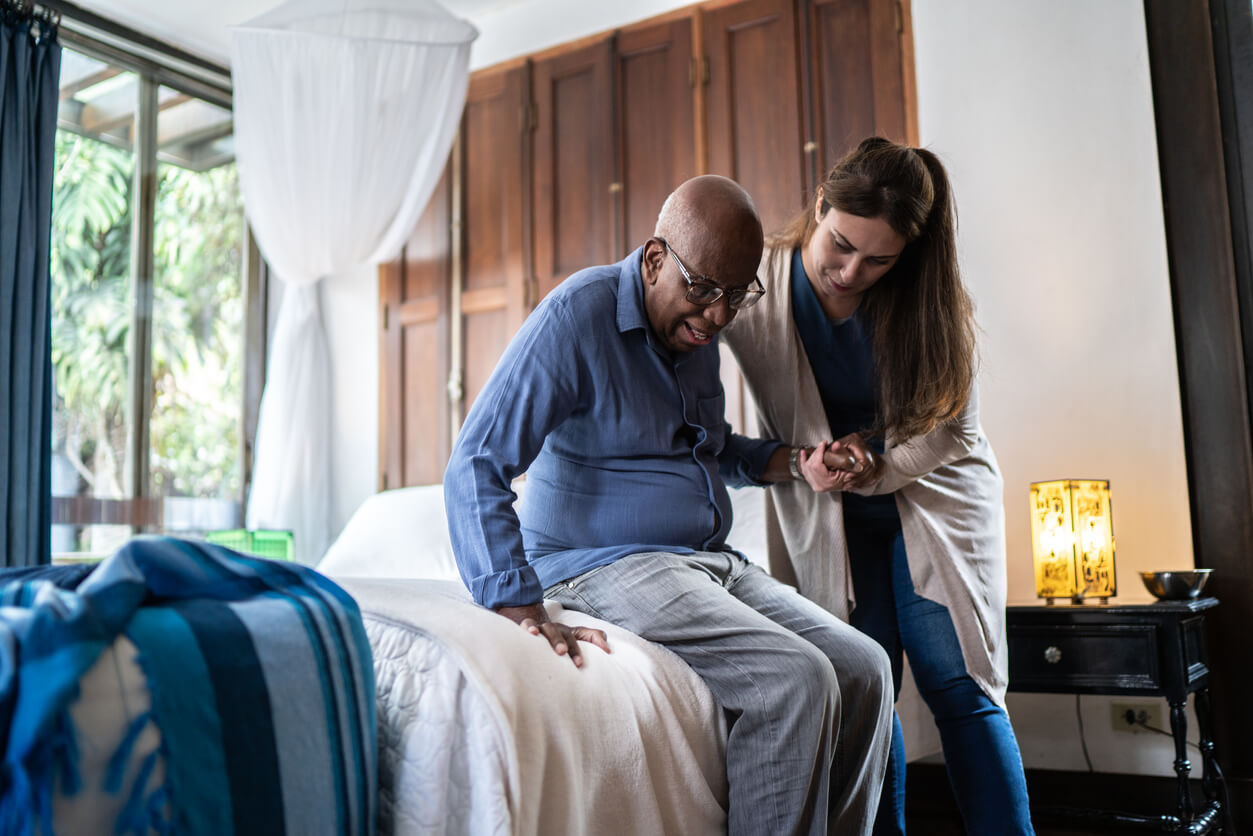Assisted Living vs. Home Care: Understanding Expenses
- Posted on
- By wpengine

Determining the type of Senior Living community you’ll live in as you age is one of the most important decisions you make. But with all the options out there with similar features, it is only natural that it can be overwhelming. You also have to worry about the cost so you can get the care you need without breaking the budget.
If maintaining your independence is important to you, but you need help with some day-to-day tasks, you may have looked at Assisted Living and Home Care. This guide will break down their arrangements and costs to provide clarity that can help you make an informed decision on which is the best option for you or your senior loved one.
Assisted Living vs. Home Care: How They Compare
Assisted Living communities and Home Care have many similarities depending on the type of Home Care. However, there are some key differences besides the location. Understanding these differences can help you choose the best option for your unique needs and situation.
Assisted Living Communities
Assisted Living offers a blend of independence and support. It’s designed for seniors who cherish their freedom but need a helping hand with activities of daily living (ADLs). Living in an Assisted Living facility is ideal if you find maintaining a home challenging, but do not need the intensive medical care provided in nursing homes.
Assisted Living communities are typically designed like hotels with private units or apartment complexes and can house anywhere from a dozen to hundreds of older adults. In an Assisted Living facility, you can enjoy private or semi-private accommodations and communal spaces for dining, socializing, and activities.
Assisted Living facilities typically offer:
- Meal services
- Housekeeping
- Assistance with ADLs, such as bathing, dressing, and grooming
- Medication management
Assisted Living communities also offer a wide variety of social and recreational activities so you can enjoy an active and engaged lifestyle.
Home Care
Unlike Assisted Living facilities, Home Care allows individuals to receive support in their own homes so they can age in place comfortably and with dignity. There are three types:
- Companion care: This is ideal if you can live independently and don’t need much help with ADLs, but want someone to spend time with you for social support.
- ADL assistance: This level of care is comparable to what you’d get in an Assisted Living community, except you can enjoy it from the comfort of your own home.
- Home health care: This is a special type of Home Care in which a certified home health aide provides medical assistance. A physician typically recommends this type of Home Care, and you may have to have a written order to get insurance coverage. Home health care is ideal if you need frequent medical services like infusions, wound care, or injections or for short-term recovery and physical therapy services. In some cases, you may even receive skilled nursing care in your home if the health aide is properly certified.
Home Care services can range from a few hours a week to around-the-clock care depending on your individual needs. In this way, they support your physical and emotional well-being by allowing you to retain your connection to your home and community while getting the care you need.
Typical Assisted Living Expenses
Assisted Living costs an average of $4,500 per month—$54,000 per year—in the United States. Most Assisted Living facilities offer the same basic services that you pay for.
Room and Board
The base fee of Assisted Living pays for your room and board, including utilities and three meals a day. This cost may vary based on the amount of space you need and if you’re in a private room or sharing with someone else.
Personal Care Services
These Assisted Living services are another major expense that make up a large bulk of your Assisted Living costs. Depending on the level of care you need, you may pay for:
- Medication management
- Help with ADLs
- Meal planning and cooking
- Help with mobility
- Housekeeping
- Help with toileting and using the bathroom
Auxiliary Services
If you need a higher level of care in Assisted Living facilities, the services that support it will be another expense. These additional services often require highly skilled staff and include:
- Memory care
- Transportation
- Supervision and care
- On-site healthcare services
Typical Home Care Expenses
In-Home Care is typically charged on a per-hour basis. The average cost of in-home care in the U.S. is $32.00 per hour, which amounts to roughly $5,200 per month for round-the-clock care. However, your expenses may be much lower if you only require occasional help or just a few hours each day.
Home Care costs can vary widely by state, but they generally have the same basic expenses depending on the type of in-home care you receive.
Personal care services
These services involve providing one-on-one care to help with day-to-day activities. When it comes to in-home care, it may include:
- Self-care assistance: Bathing, grooming, dressing, and using the toilet
- Mobility: Assistance with transfers, walking, and fall prevention
- Meals: Meal planning and preparation
- Housekeeping: Laundry and light cleaning
- Supervision: Monitoring individuals with dementia or Alzheimer’s disease
Companionship
In Home Care, a companion typically helps with social interaction, household assistance, and daily living support. This can encompass services such as:
- Social interaction: Engaging in conversations, participating in recreational activities or hobbies that you enjoy, providing emotional support and encouragement, and going with you to social gatherings, events, or outings.
- Household assistance: Helping with light housekeeping tasks, meal preparation, and running errands such as picking up prescriptions or grocery shopping.
- Assistance with ADLs: Giving medication reminders, mobility assistance around the house or on outings, and help with personal care tasks.
- Coordinating care: Communicating with your family members or other caregivers to coordinate care and helping you schedule appointments or get transportation to doctor’s visits.
Transportation
Transportation services help you keep your independence and access to your local community. The services you receive vary slightly depending on the type of Home Care provided.
- Companion care: Trips to social events, shopping, or leisure activities
- Personal assistance: Visits to healthcare providers and pharmacies, or running daily errands
- Home health care: Transportation to medical appointments, rehabilitation sessions, or hospitals
No matter the type, the goal of transportation services is to allow you to engage with your community, maintain your health care routines, and improve your quality of life.
Medical care
If you are receiving home health care, your expenses will include visits from doctors, skilled nurses, and physical therapists. Examples of services provided on-site may include:
- Physical therapy
- Short-term nursing services
- Occupational therapy
- Medical social work
- Speech language pathology
- Home health aide services
Choosing the Right Senior Living Option
Choosing between Assisted Living facilities and Home Care requires a balance between care, community, comfort, and budget. By carefully weighing the value you receive for the price and whether you want to receive care in your own home or a facility with a strong internal community, you can make the best choice for you.
Get Affordable Senior Living with Mira Vie
Mira Vie understands this delicate balance. Our commitment to providing affordable Senior Living solutions means we focus on creating environments where care, a sense of belonging, and the freedom to enjoy life as you see fit are at the heart of everything we do.
With a variety of living options tailored to meet diverse needs and preferences—such as Independent Living, Assisted Living, Memory Care—Mira Vie is dedicated to helping older adults find a place to live and thrive. Contact us to discover how we make Senior Living accessible and fulfilling.
Related Articles

Mira Vie at Manalapan Earns 2025 AHCA/NCAL Bronze National Quality Award
Manalapan, New Jersey – Mira Vie at Manalapan has been recognized as a 2025 recipient
